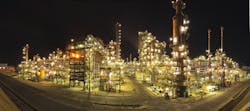Petron Corp., Mandaluyong City, Philippines, has started fuel marking at its 180,000-b/d Bataan refinery at Limay, about 150 km southwest of Manila, to support the government’s efforts to curb fuel smuggling.
Petron began fuel marking at the Bataan refinery on Dec. 23, with fuel marking also initiated at the company’s Misamis Oriental import terminal as of yearend 2019, the operator said on Jan. 3.
“We are optimistic that the fuel marking program will significantly address fuel smuggling, which has been a constant deterrent to the continued growth of our economy. Consumers also stand to gain once everyone gets on board as it will ensure that all fuel products in the market will be legitimately sourced,” said Ramon S. Ang, Petron’s president and chief executive officer.
“These developments in our facilities testify to our firm commitment to support the government in their fight against smuggling. We also continue to work with their fuel marking team for the installation of the automatic injection system in our refinery,” Ang added.
Petron has been in close coordination with concerned government agencies—namely the Philippines’ Department of Finance, Bureau of Internal Revenue, and Bureau of Customs—since 2018 regarding solutions to curb fuel smuggling in the country.
The Bataan fuel-marking project follows the operator’s 2018 award of a contract to Honeywell UOP LLC to provide technology licensing for expanding and upgrading production capacity at the refinery (OGJ Online, July 24, 2018).
As part of the upgrading and expansion project, Honeywell UOP will deliver basic engineering design, technology licensing, and associated services for a condensate fractionation unit, naphtha hydrotreater, and its proprietary UOP CCR Platforming, Sulfolane, LPG and kerosine Merox, and distillate Unionfining units to enable the refinery to meet rising domestic demand for motor fuels by upgrading 100,000 b/d of condensates and light crude oils to aromatics and automotive fuels.
Designed to help the country meet increased demand for cleaner-burning gasoline and diesel, the expansion project—which adds a second aromatics train at the site—will allow the refinery to produce 75,000 b/d of refined fuels and 1 million tonnes/year of aromatics, increasing overall production capacity of 55%.
A timeframe for when the revamp and expansion project will be completed, however, has yet to be disclosed.
About the Author
Robert Brelsford
Downstream Editor
Robert Brelsford joined Oil & Gas Journal in October 2013 as downstream technology editor after 8 years as a crude oil price and news reporter on spot crude transactions at the US Gulf Coast, West Coast, Canadian, and Latin American markets. He holds a BA (2000) in English from Rice University and an MS (2003) in education and social policy from Northwestern University.

